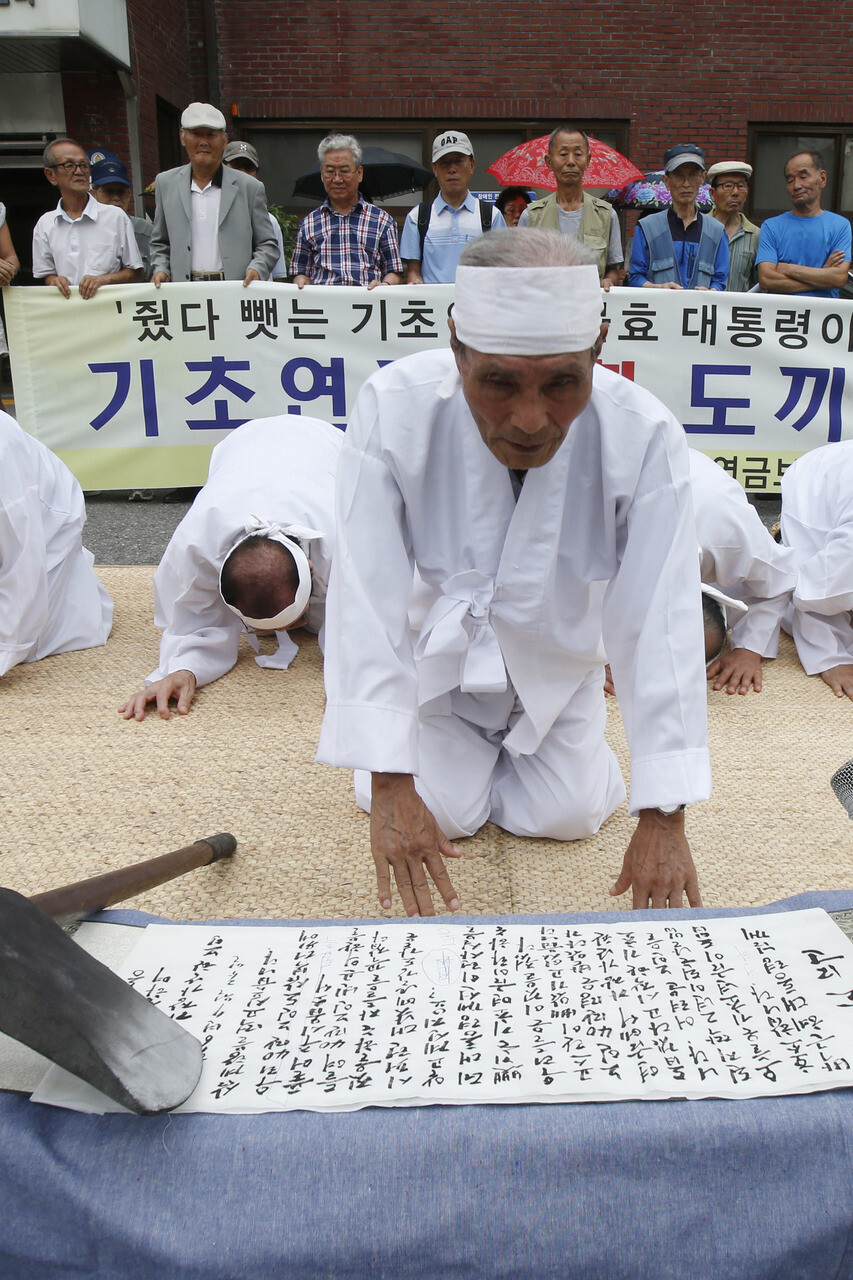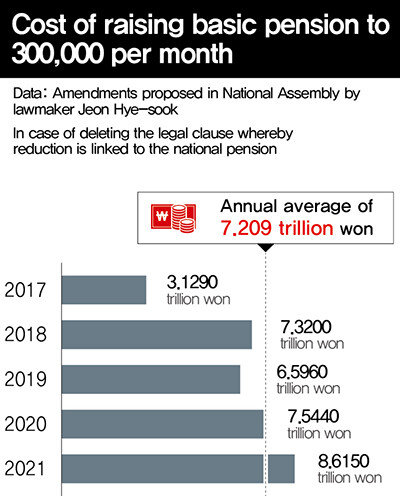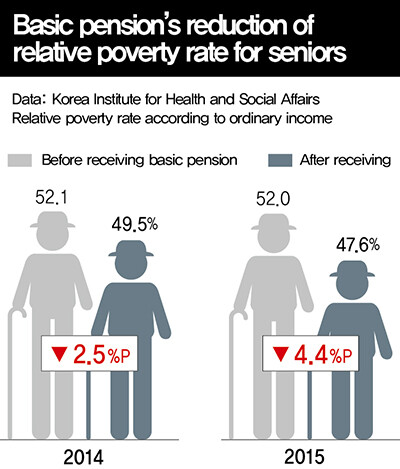hankyoreh
Links to other country sites 다른 나라 사이트 링크
At two-year point, has basic pension eased elderly poverty?

July 25 marked the two-year anniversary of the basic pension system, which provides benefits of 200,000 won (US$178) a month to South Koreans aged 65 and older. The political opposition and civic groups are now clamoring for the benefits to be raised to 300,000 won (US$267) and made available to seniors receiving Basic Livelihood Benefits. The South Korean government has claimed that its focus still needs to be on stabilizing the system, noting its effects in decreasing the elderly poverty rate.
How much has the poverty rate fallen?

The basic pension is a system to guarantee income for the lowest-earning 70% of elderly people. Calculation of recognized income is based on income and assets: seniors who live alone are entitled to benefits if they do not make more than one million won (US$889) a month. For senior couples, the total is 1.6 million won (US$1,423) a month. Benefits were first granted to 4.24 million seniors on July 25, 2014. Since then, the number of beneficiaries has steadily risen, with a total of 4.54 million as of Feb. 2016.
The increase in cash income for seniors without much in the way of post-retirement earnings seems to have had clear effects in slightly reducing elderly poverty. In a report titled “Analysis of the Basic Pension‘s Effect in Reducing Poverty,” Korea Institute for Health and Social Affairs researcher Lim Wan-sub calculated the relative poverty rate for seniors (those earning less than 50% the median) at 47.6% and 52.0% under scenarios of receiving and not receiving basic pension benefits last year. In other words, payment of basic pension benefits translated into a 4.4-percentage-point decrease in the poverty rate. In contrast, the decline in the poverty rate from payment of the basic pension’s previous incarnation, the basic old age pension - with a maximum payout of around 99,000 won (US$88) - was just 1.6 percentage points for 2013. The numbers suggest the basic pension is indeed slightly more effective in reducing elderly poverty.
“Payment of basic pension benefits had a positive impact in improving income levels for senior citizens,” Lim said.
“But it does not appear to have translated immediately into an increase in consumer spending that could be said to have improved senior welfare,” he added.
Flurry of legislation: Hike to 300,000 won?

Two years have passed, yet calls to improve the basic pension have been present since the beginning. The system was originally put in place after then-candidate Park Geun-hye pledged to provide all elderly people with 200,000 won a month during the 2012 presidential election. The actual implementation saw benefits restricted to only the 70% lowest-earning seniors, and even then distributed on a graduated basis according to period of national pension enrollment rather than as an equal 200,000-won payment to all.
Another problem has become the focus of attention: the poorest of seniors - Basic Livelihood Benefits recipients - have failed to enjoy basic pension benefits. While they are entitled to a basic pension payout on the 25th of the month, a total of 200,000 won is subtracted from the original amount of the livelihood benefits they receive on the 20th of each month. The 200,000 won received from the basic pension is calculated as recognized income - earning the basic pension a reputation as money that is given and then taken away.
Amendments proposed last month in the National Assembly to amend the Basic Pension Act (by opposition Minjoo Party of Korea lawmaker Jeon Hye-sook) and National Basic Living Security Act (by fellow Minjoo lawmaker Jung Choun-sook) would raise basic pension benefits to 300,000 won and eliminate cuts linked to the national pension enrollment period, while exempting the benefits from recognized income when paying basic livelihood security benefits. The plan to raise the basic pension benefits was based on the conclusion that the national pension was as yet failing to perform its intended role.
But while the opposition having more seats in the National Assembly has resulted in louder calls, finances remain the biggest barrier to passing parliamentary review. A National Assembly Budget Office estimation of costs from the central and local government calculated that Jun‘s plan to raise benefits to 300,000 won would require an average of 7.209 trillion won (US$6.4 billion) a year for the five years from 2017 to 2021, while Jung’s plan to offer benefits to the 360,000-370,000 seniors receiving Basic Livelihood Benefits would cost an average of 1.377 trillion won (US$1.2 billion) per year.
The government is currently maintaining that the system‘s relatively recent introduction means it is too soon to begin amending related laws.
“As of last March, 66.5% of seniors were receiving the basic pension. Once people on the borderline for recognized income are eliminated, many of them don’t apply again because they’re unaware that they’ve met the conditions,” explained Shin Wook-su, who heads the basic pension division of the Ministry of Health and Welfare.
“We’re planning to focus a bit more on establishing things through a history management system that offers active guidance to seniors hoping to apply for benefits,” Shin added.
Oh Geon-ho, co-chair of the group Create Your Own Welfare State, said the basic pension system “started out with some ’inconvenient truths‘ in 2014 because it was slapped together for the upcoming local elections that year.”
“The most urgent problem that needs to be addressed is that the basic pension has exacerbated poverty among seniors, since cash income has risen for most seniors while the poorest of them [Basic Livelihood Benefits recipients] remain stuck where they are,” Oh said.
By Hwangbo Yon, staff reporter
Please direct questions or comments to [english@hani.co.kr]

Editorial・opinion
![[Column] Season 2 of special prosecutor probe may be coming to Korea soon [Column] Season 2 of special prosecutor probe may be coming to Korea soon](https://flexible.img.hani.co.kr/flexible/normal/500/300/imgdb/original/2024/0426/3317141030699447.jpg) [Column] Season 2 of special prosecutor probe may be coming to Korea soon
[Column] Season 2 of special prosecutor probe may be coming to Korea soon![[Column] Park Geun-hye déjà vu in Yoon Suk-yeol [Column] Park Geun-hye déjà vu in Yoon Suk-yeol](https://flexible.img.hani.co.kr/flexible/normal/500/300/imgdb/original/2024/0424/651713945113788.jpg) [Column] Park Geun-hye déjà vu in Yoon Suk-yeol
[Column] Park Geun-hye déjà vu in Yoon Suk-yeol- [Editorial] New weight of N. Korea’s nuclear threats makes dialogue all the more urgent
- [Guest essay] The real reason Korea’s new right wants to dub Rhee a founding father
- [Column] ‘Choson’: Is it time we start referring to N. Korea in its own terms?
- [Editorial] Japan’s rewriting of history with Korea has gone too far
- [Column] The president’s questionable capacity for dialogue
- [Column] Are chaebol firms just pizza pies for families to divvy up as they please?
- [Column] Has Korea, too, crossed the Rubicon on China?
- [Correspondent’s column] In Japan’s alliance with US, echoes of its past alliances with UK
Most viewed articles
- 1Division commander ordered troops to enter raging flood waters before Marine died, survivor says
- 2‘We must say no’: Seoul defense chief on Korean, USFK involvement in hypothetical Taiwan crisis
- 3Is N. Korea threatening to test nukes in response to possible new US-led sanctions body?
- 4No good, very bad game for Korea puts it out of Olympics for first time since 1988
- 5Korea’s 1.3% growth in Q1 signals ‘textbook’ return to growth, says government
- 6US overtakes China as Korea’s top export market, prompting trade sanction jitters
- 7[Column] Has Korea, too, crossed the Rubicon on China?
- 8[Column] ‘Choson’: Is it time we start referring to N. Korea in its own terms?
- 9Will NewJeans end up collateral damage in internal feud at K-pop juggernaut Hybe?
- 10Samsung subcontractor worker commits suicide from work stress